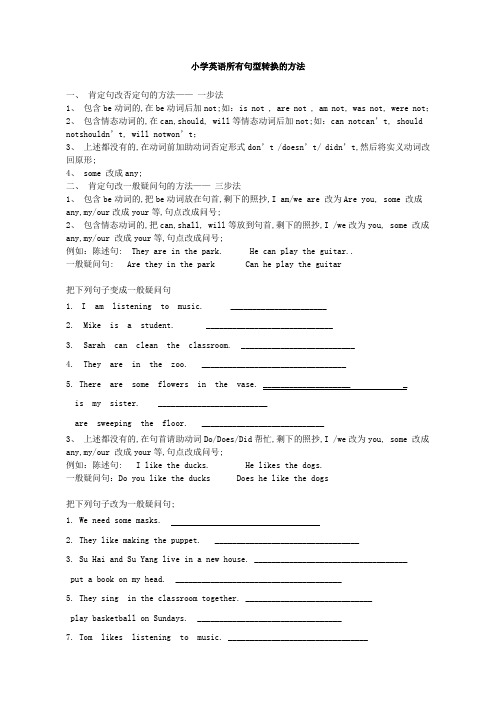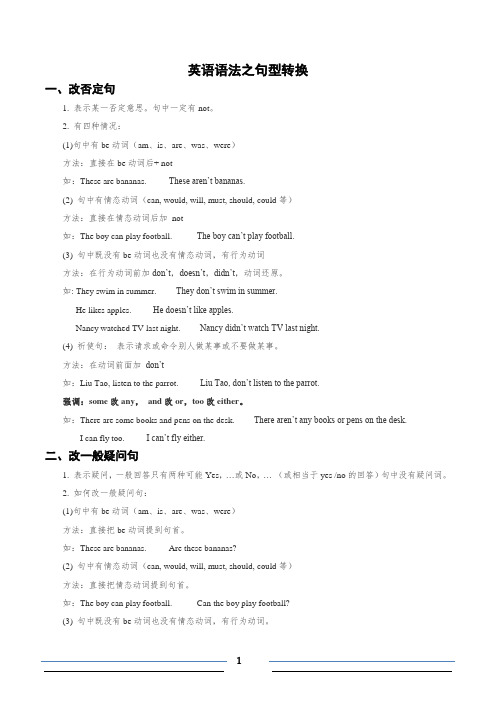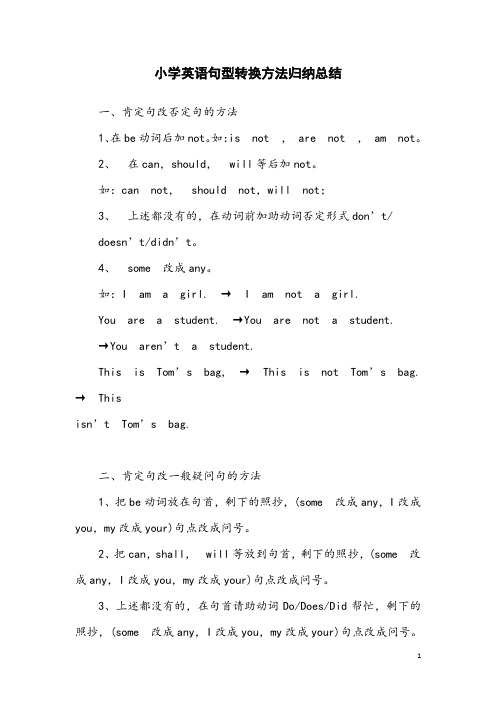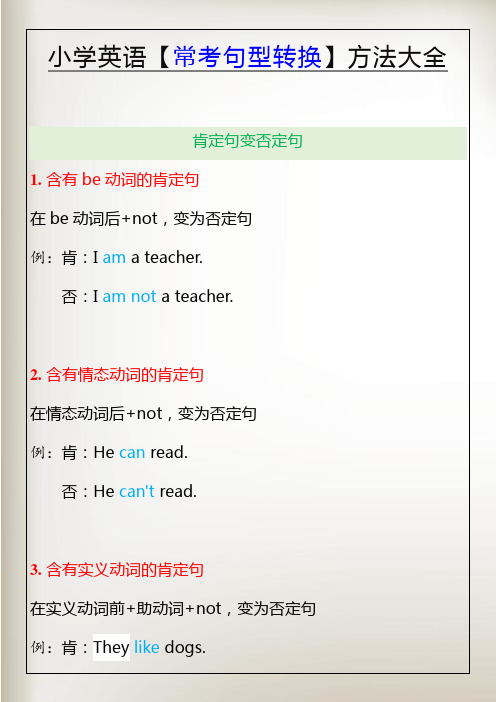小学英语的句型转换类型汇总
小学英语句型转换整理

小学英语所有句型转换的方法一、肯定句改否定句的方法——一步法1、包含be动词的,在be动词后加not;如:is not , are not , am not, was not, were not;2、包含情态动词的,在can,should, will等情态动词后加not;如:can notcan’t, should notshouldn’t, will notwon’t;3、上述都没有的,在动词前加助动词否定形式don’t /doesn’t/ didn’t,然后将实义动词改回原形;4、 some 改成any;二、肯定句改一般疑问句的方法——三步法1、包含be动词的,把be动词放在句首,剩下的照抄,I am/we are 改为Are you, some 改成any,my/our改成your等,句点改成问号;2、包含情态动词的,把can,shall, will等放到句首,剩下的照抄,I /we改为you, some 改成any,my/our 改成your等,句点改成问号;例如:陈述句: They are in the park. He can play the guitar..一般疑问句: Are they in the park Can he play the guitar把下列句子变成一般疑问句1. I am listening to music. ______________________2. Mike is a student. _____________________________3. Sarah can clean the classroom. __________________________4. They are in the zoo. _________________________________5. There are some flowers in the vase. ____________________ _is my sister. _________________________are sweeping the floor. ____________________________3、上述都没有的,在句首请助动词Do/Does/Did帮忙,剩下的照抄,I /we改为you, some 改成any,my/our 改成your等,句点改成问号;例如:陈述句: I like the ducks. He likes the dogs.一般疑问句:Do you like the ducks Does he like the dogs把下列句子改为一般疑问句;1. We need some masks.2. They like making the puppet. _________________________________3. Su Hai and Su Yang live in a new house. ___________________________________put a book on my head. ______________________________________5. They sing in the classroom together. _____________________________play basketball on Sundays. _________________________________7. Tom likes listening to music. ________________________________三、肯定句改特殊疑问句的方法——四步法1、句首添加特殊疑问词根据划线部分确定是什么疑问词;2、划线部分去掉;3、把剩下的句子按照改一般疑问句的方法改完;特例:How many询问数量后紧接物品,EG: How many kites can you see/ How many books are there on the desk 等4、查补某些特殊的句型需要添词或减词;句号改成问号;句型转换题1. The girl is singing in the classroom.改为否定句改为一般疑问句2. They are looking for bag.对画线部分提问3. I am riding my bike now.同上4. There are twelve studens over there.同上5. I can speak English.改为一般疑问句6. I am writing now.同上7. I have a desk and a chair.用He做主语改写句子8. She is buying some food in the supermarket.改为否定句9. I am ill. 对画线部分提问10. Does she like growing flowers 给予否定回答11. I will make model planes with my classmates on Sunday. 对画线部分提问12. The girl dances beautifully.改为感叹句13. The waiter and the waitress play table tennis every day. 改为否定句14. The boy is standing on the man's shoulders.改为一般疑问句15. It's ten o'clock.对画线部分提问关于特殊疑问词组针对人提问谁 /何人 who 地点何地 where 原因 why时间何时 when what time 方式方法程序怎样 how年龄 how old 体重 how heavy 长度 how long 身高 how tall可数名词问多少 How many 不可数名词问多少,多少钱 How much东西职业事物什么 what颜色 what color 时刻 what time选择某一个 which练一练1、A: _______ is the boy in blue B:He’s Mike.2、A: _______ pen is it B:It’s mine.3、A: _______ is the diary B:It’s under the chair.4、A: is the Chirstmas DayB: It’s on the 25th of December.5、A: _______ are the earphones B:They are 25 yuan.6、A: _______ is the cup B:It’s blue.7、A: _______ is it today B:It’s Sunday.8、A: _______ was it yesterday B: It was the 13th of October.9、A: _______ this red one B:It’s beautiful.10、A: Can I have some paper and some crayonsB: _______ A: I want to make a kite.12、A:_______ is your cousin B: He’s 15 years old.13、A:_______ do you have dinnerB: At 6 o’clock.1.He does well in Maths. 改为否定句2.Mike runs as fast as Ben. 改为一般疑问句3.I get up at six thirty every day. 用yesterday morning every day is good at English and Maths. 对画线部分提问5.Ben runs fast. I run faster. 两句合并为一句6. The policeman caught the thief. 改为一般疑问句,作否定回答7.He is thirty kilos. 对画线部分提问8.Turn right at the third crossing. 改为否定句9.Are they American cars 改为单数10.Don’t go along this street.改为肯定句11.Give the purse to me. 换一种说法,句意不变12.The policeman caught the thief. 改问现在进行时13. I get to the shopping center by bus. 对画线部分提问14.It always rains in summer there. 改为一般疑问句,作肯定回答15.It’s cold in winter there. 对画线部分提问16.I like autumn best. 改为否定句17.Su Yang is asking Ben some questions. 对画线部分提问18.Please turn off the light. 改为否定句know his telephone number. 改为一般疑问句20.The children have school today. 改为否定句’d like to join them.改为一般疑问句are going to see a film tomorrow. 对画线部分提问like collecting stamps and singing. 改为否定句24.He often cleans his bedroom. 改为一般疑问句25. Liu Tao is watering flowers in the garden. 对画线部分提问26.David and Mike are going to planting trees this afternoon. 对画线部分提问27.He did his homework in the classroom. 改为否定句Bing is heavier than Gao Shan. 对画线部分提问jumps as far as Mike. 改为否定句see a man behind me. 改为一般过去时boy can jump higher than the girl. 改为否定句is hot in summer in New York. 对画线部分提问34.Liu Ting needs some pencils. 改为否定句35.She is an English girl. 变为复数36.They are our women doctors. 变为单数37.Mary can fly. 变为一般疑问句,并作否定回答38.I like playing football. 改成第三人称单数he39.He has a brother. 改为一般疑问句40.Nancy drew some pictures yesterday. 改为否定句41. Liu Tao usually reads newspaper. 改为过去时1.The children had a good time in the park. 否定句:______________________________2.一般疑问句:_____________________________________3.2. There were about nine hundred people at the concert音乐会. 否定句:_____________________________________ 一般疑问句:_____________________________________ 对划线部分提问:____________________________________4.There was only one problem. 否定句:_____________________________________一般疑问句:_____________________________________肯定/否定回答:____________________________________5.Ann did her homework yesterday evening. 否定句:_______________________________一般疑问句:_____________________________________对划线部分提问:____________________________________st week I read an English book. 否定句:_____________________________________一般疑问句:_____________________________________肯定/否定回答:____________________________________ 对划线部分提问:____________________________________7.My brother was in the park just now. 否定句:__________________________________一般疑问句:_____________________________________ 肯定/否定回答:____________________________________ 对划线部分提问:____________________________________8.She had some bread for lunch today. 否定句:____________________________________ 一般疑问句:_____________________________________肯定/否定回答:____________________________________9.They read English last night. 否定句:__________________________________________ 一般疑问句:________________________________________ 肯定/否定回答:____________________________________ 对划线部分提问:____________________________________。
小学英语语法:句型转换

英语语法之句型转换一、改否定句1. 表示某一否定意思。
句中一定有not。
2. 有四种情况:(1)句中有be动词(am、is、are、was、were)方法:直接在be动词后+ not如:These are bananas. -------These aren’t bananas.(2) 句中有情态动词(can, would, will, must, should, could等)方法:直接在情态动词后加not如:The boy can play football. ------- The boy can’t play football.(3) 句中既没有be动词也没有情态动词,有行为动词方法:在行为动词前加don’t,doesn’t,didn’t,动词还原。
如: They swim in summer. ------They don’t swim in summer.He likes apples. ------ He doesn’t like apples.Nancy watched TV last night. ------Nancy didn’t watch TV last night.(4) 祈使句:表示请求或命令别人做某事或不要做某事。
方法:在动词前面加don’t如:Liu Tao, listen to the parrot. ------ Liu Tao, don’t listen to the parrot.强调:some改any,and改or,too改either。
如:There are some books and pens on the desk. ------There aren’t any books or pens on the desk.I can fly too. ------ I can’t fly either.二、改一般疑问句1. 表示疑问,一般回答只有两种可能Yes,…或No,… (或相当于yes /no的回答)句中没有疑问词。
句型转换小学常见句型变换技巧解析

句型转换小学常见句型变换技巧解析句子是语言表达的基本单位,句型的变化对于提高句子的表达能力至关重要。
在小学阶段,学生需要掌握一些常见句型的转换技巧,以丰富表达方式,增强语言的灵活运用能力。
本文将介绍一些常见的句型转换技巧,帮助小学生提高语言表达能力。
1. 直陈句转疑问句在英语中,直陈句可以通过改变句子结构来转换成疑问句。
要转换为一般疑问句,只需把句首的助动词或be动词提到句首即可。
例如:直陈句:He is a student.一般疑问句:Is he a student?对于没有助动词或be动词的句子,我们可以使用do/does/did来转换。
例如:直陈句:She likes ice cream.一般疑问句:Does she like ice cream?2. 直陈句转否定句直陈句可以通过在助动词或be动词后面加not来转换成否定句。
例如:直陈句:I am a student.否定句:I am not a student.对于没有助动词或be动词的句子,我们可以使用do/does/did来转换。
例如:直陈句:They play soccer.否定句:They do not play soccer.3. 陈述句转祈使句陈述句可以通过去掉主语和be动词来转换成祈使句。
例如:陈述句:You are a good student.祈使句:Be a good student.4. 直陈句转感叹句直陈句可以通过在句首加上“What”、“How”等疑问词或感叹词来转换成感叹句。
例如:直陈句:The book is interesting.感叹句:How interesting the book is!5. 陈述句转条件句陈述句可以通过在句首加上if来转换成条件句。
例如:陈述句:I will go to the park tomorrow.条件句:If I go to the park tomorrow.6. 直陈句转间接引语直陈句可以通过改变人称和时态,引入引号和连词来转换成间接引语。
小学英语句型转换方法归纳总结

小学英语句型转换方法归纳总结一、肯定句改否定句的方法1、在be动词后加not。
如:is not ,are not ,am not。
2、在can,should,will等后加not。
如:can not,should not,will not;3、上述都没有的,在动词前加助动词否定形式don’t/doesn’t/didn’t。
4、some 改成any。
如:I am a girl. →I am not a girl.You are a student. →You are not a student.→You aren’t a student.This is Tom’s bag, →This is not Tom’s bag.→Thisisn’t Tom’s bag.二、肯定句改一般疑问句的方法1、把be动词放在句首,剩下的照抄,(some 改成any,I改成you,my改成your)句点改成问号。
2、把can,shall,will等放到句首,剩下的照抄,(some 改成any,I改成you,my改成your)句点改成问号。
3、上述都没有的,在句首请助动词Do/Does/Did帮忙,剩下的照抄,(some 改成any,I改成you,my改成your)句点改成问号。
注意:句首的第一个字母要大写,句尾标点应为“?”。
如:I am in Class 6. →Are you in Class 6?You are from America. →Are you from America?It is an orange. →Is it an orange?4、就一般疑问句回答一般疑问句有两种回答,即:肯定回答和否定回答。
其中,肯定回答用yes,否定回答用no。
语句顺序为:Yes + 主语+ am /is/ are/was/were.|can.|do/does/did|; No + 主语+ am not/ isn’t/ aren’t如:—Are you an English teacher?→Yes, I am. /No, I am not.—Is that a bird? →Yes, it is./ No, it isn’t.三、对划线部分提问“就划线部分提问”是小学阶段英语学习的难点,但是一旦掌握了规律,就变得容易多了。
小学英语句型转换技巧汇总

小学英语句型转换技巧汇总一、肯定句改否定句1.在be动词/情态动词(can/should/will/may等)后+not 肯定句:I am a student.否定句:I am not a student.肯定句:You are sad.否定句:You are not sad.肯定句:I can swim.否定句:I can not swim.肯定句:You will go to the park.否定句:You will not go to the park.2.在动词前加助动词否定形式don't/doesn't/didn't①当句中的动词是原形时,加don't。
肯定句:I like English.否定句:I don't like English.肯定句:You have dinner.否定句:You don't have dinner.②当句中的动词是第三人称单数时,用doesn't+词原形。
肯定句:She likes singing.否定句:She doesn't like singing.肯定句:She does her homework.否定句:She doesn't do her homework.③当句中的动词是过去式时,用didn't+动词原形肯定句:We had a great time during our holidays.否定句:We didn't have a great time during our holidays.3.当出现动词have/has时,应分情况讨论。
①当have表示“某人有什么的时候”,其否定形式为have not/has not.肯定句:She has two books.否定句:She has not two books.②当have作为实意动词时,其否定形式为do not have/does not have.肯定句:You have dinner.否定句:You do not have dinner.③当have在完成时中作为助动词时,其否定形式为have not/has not.肯定句:I have seen this film.否定句:I have not seen this film.4.肯定陈述句中的some/too,在否定陈述句中应改为any/either。
小学英语【常考句型转换】方法大全

小学英语【常考句型转换】方法大全
肯定句变否定句
1.含有be动词的肯定句
在be动词后+not,变为否定句
例:肯:I am a teacher.
否:I am not a teacher.
2.含有情态动词的肯定句
在情态动词后+not,变为否定句
例:肯:He can read.
否:He can't read.
3.含有实义动词的肯定句
在实义动词前+助动词+not,变为否定句
例:肯:They like dogs.
否:They don't like dogs.
4.肯定句中含有some时
变为否定句,除了+not,还要把some变成any
例:肯:There are some books in the bag.
否:There are n't any books in the bag.
肯定句变一般疑问句
1.含有be动词的肯定句
把be动词提到句首,其它照搬,句号变问号碰到第一、二人称时,要互换。
例:肯:I am a teacher.
否:Are you a teacher?
2.含有情态动词的肯定句
把情态动词提到句首,其它照搬,句号变问号。
小学英语基本句子结构与句型转换

小学英语基本句子结构与句型转换1.基本句子结构:-主语+谓语-主语+谓语+宾语-主语+谓语+宾语+宾语补足语-主语+谓语+表语-主语+谓语+宾语+表语2.句型转换:- 肯定句变否定句:将谓语动词前加上 "do not" 或 "does not"。
- 否定句变肯定句:删除谓语动词前的 "do not" 或 "does not"。
-一般疑问句:将谓语动词调整到句首,并在句末加上问号。
- 特殊疑问句:疑问词(如 what, where, who, when, why, how)放在句首,然后按照一般疑问句的结构进行调整。
- 肯定句变否定问句:在肯定句的句首加上 "do" 或 "does",并在句末加上问号。
- 否定句变肯定问句:删除谓语动词前的 "do not" 或 "does not",并在句末加上问号。
-祈使句:将谓语动词原型放在句首,并在句末加上句号或感叹号。
- 感叹句:在肯定句的句首加上 "how",并在句末加上感叹号。
例子:1.基本句子结构:- 我喜欢游泳。
I like swimming.- 她正在读书。
She is reading.2.句型转换:- 肯定句变否定句:I don't like swimming. She isn't reading.- 否定句变肯定句:I like swimming. She is reading.- 一般疑问句:Do you like swimming? Is she reading?- 特殊疑问句:What do you like? Where is she reading?- 肯定句变否定问句:Don't you like swimming? Isn't she reading?- 否定句变肯定问句:Do you like swimming? Is she reading?- 祈使句:Like swimming. Read.- 感叹句:How beautiful it is!。
小学阶段英语句型转换

6. He likes Chinese. Does he like Chinese?
7. Maria comes from Cuba.
Does Maria come from Cuba?
8.We speak Chinese. Do you speak Chinese?
练习二: 将下列句子变成一般疑问句。
Do Tthheeyy come from China ?.
一加、二变、三问号
Did hHee ccleleaanned the room ?.
二.对划线部分提问.
五.对划线部分提问.
将划线部分去掉,分析句意,选择特殊疑问词。 1.My name is Nancy. What’s your name? 2.I am from China. Where are you from? 3.I am fine . How are you? 4. Miss Wang is our English teacher.
练习:给下列句子做肯定回答或否定回答。
1.Are you a student? Yes, I am . No, I’m not .
2. Do they like English? Yes, they do . No, they don’t .
3.Is Jane a girl? Yes, she is . No, she isn’t .
4) Tim can play football. Tim can’t play football ?
2. 句子里没有be\情态V 时,在动词前加 don’t、doesn’t 、didn’t (动词用原形)。
1) I have a book . I don’t have a book.
- 1、下载文档前请自行甄别文档内容的完整性,平台不提供额外的编辑、内容补充、找答案等附加服务。
- 2、"仅部分预览"的文档,不可在线预览部分如存在完整性等问题,可反馈申请退款(可完整预览的文档不适用该条件!)。
- 3、如文档侵犯您的权益,请联系客服反馈,我们会尽快为您处理(人工客服工作时间:9:00-18:30)。
小学英语的句型转换类型汇总
1肯定句改否定句的方法:
1、在be动词后加not。
如:is not ,are not ,am not
2、在can,should,will等后加not。
如:cannot,should not,will not;
3、上述都没有的,在动词前加助动词否定形式don’t/doesn’t/didn’t。
4、some 改成any。
如:I am a girl. →I am not a girl.
You are a student. →You are not a student.
→You aren’t a student.
This is Tom’s bag, →This is not Tom’s bag.→This isn’t Tom’s bag.
2肯定句改一般疑问句的方法
1、把be动词放在句首,剩下的照抄,(some 改成any,I改成you,my改成your,)句点改成问号。
2、把can,shall,will等放到句首,剩下的照抄,(some 改成any,I改成you,my改成your,)句点改成问号。
3、上述都没有的,在句首请助动词Do/Does/Did帮忙,剩下的照抄,(some 改成any,I改成you,my改成your,)句点改成问号。
注意:句首的第一个字母要大写,句尾标点应为“?”。
如:
I am in Class 6. →Are you in Class 6?
You are from America. →Are you from America?
It is an orange. →Is it an orange?
4、就一般疑问句回答
一般疑问句有两种回答,即:肯定回答和否定回答。
其中,肯定回答用yes,否定回答用no。
语句顺序为:Yes + 主语+ am /is/ are/was/were.|can.|do/does/did|; No + 主语+ am not/ isn’t/ aren’t 如:
—Are you an English teacher?→Yes, I am. /No, I am not.
—Is that a bird? →Yes, it is./ No, it isn’t.
3对划线部分提问
“就划线部分提问”是小学阶段英语学习的难点,但是一旦掌握了规律,就变得容易多了。
小学英语对划线部分提问之答题口诀:
一代:用正确的疑问词代替划线部分。
二移:把疑问词移至句首
三倒:颠倒主谓语,但对主语或其定语提问时除外(some 改成any,I改成you,my改成your),四抄:照抄句子剩余部分。
★特殊疑问词的确定要根据划线内容而定,在小学阶段常出现的有以下几种:
1划线部分是“事或物”,特殊疑问词用what
如: This is a book.---What is this?
I often play football on Saturdays .---What do you often do on Saturdays ?
2划线部分是“人”,特殊疑问词用who
如:He is my brother. ---Who is he ?
3划线部分是“地点”,特殊疑问词用where
如:The box is on the desk.---Where is the box ?
4划线部分是“时间”,特殊疑问词用what time或when
如:It's seven twenty . ---What time is it ?
I usually get up at six . --- When do you usually get up?
5划线部分是“年龄”,特殊疑问词用how old
如:I am twelve . ---How old are you?
My father is thirty-three . ---How old is your father ?
6划线部分是“职业”,特殊疑问词用what
如:Mike is a worker. ---What is Mike ?
7划线部分是“颜色”,特殊疑问词用what colour
如: My hat is blue . ---What colour is your hat?
8划线部分是“数量”,特殊疑问词用how many或how much
如:I can see five kites .---How many kites can you see ?
There is some milk in the glass. ---How much milk is there in the glass ?
9划线部分是“多少钱”,特殊疑问词用how much
如:This pen is nine yuan . ---How much is this pen ?
10划线部分是“形容词性物主代词或名词性物主代词”,特殊疑问词用whose 如:That is my book . ---Whose book is that ?
The bag is yours. ---Whose is the bag ?
以下口诀要牢记
1.问“谁”用who;
2.问“谁的”,用whose;
3.问“地点哪里”,用where;
4.问“原因”,用why;
5.问“身体状况”,用how;
6.问“方式”,用how;
7.问“年龄”,用how old;
8.问“多少”,用how many;
9.问"价钱”用how much;
10.问“哪一个”,用which ;
11.问“什么”,用what;
12.问“职业”,用what;
13.问“颜色”,用what colour;
14.问“星期”,用what day;
15.问什么学科,用what subject;
16.问“什么时候”,用when;
17.问几点用What’s the time?或What time is it?。
